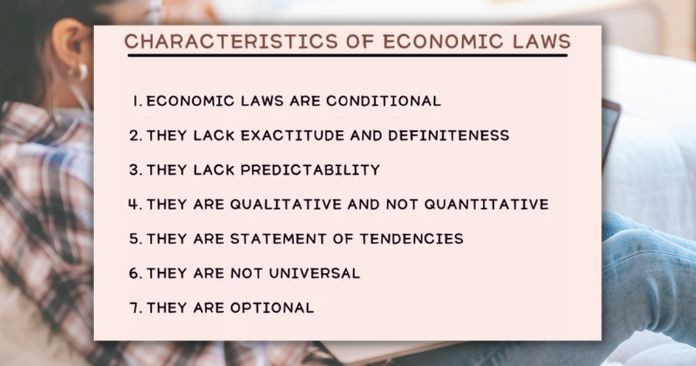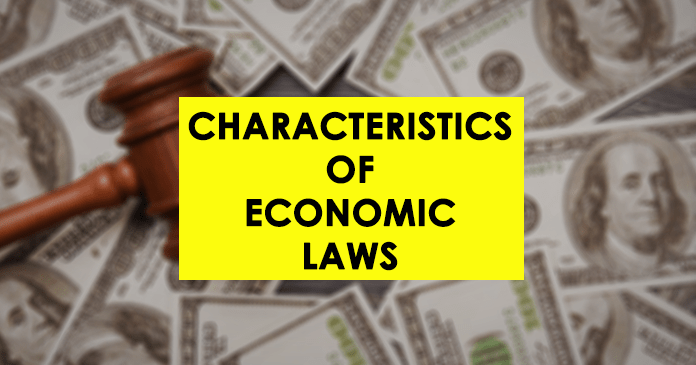Before identifying the characteristics of economic laws, let us understand what is meant by economic law.
What is Economic Laws? As we know in Economic law it is always stated that “all other factors remain constant”.
Economic laws are similar to scientific laws in that they seek to create a relation between two or more phenomena. In natural sciences as well as in economics, a definite benefit is expected depending on the particular situation.

Characteristics of economic laws
After a brief comparison of the laws of economics with the laws of other sciences, let us now consider their features:
1. Economic laws are conditional
That is why it is mentioned at the end of the Economic Law that “all other factors remain constant.” If all other factors remain constant, a rise in the price of a product or service is followed by demand, and a decline in price is followed by an increase in demand.
What are the factors that should constant here?
- Consumer income
- Taste
- Fashion items of alternatives
- Complementary commodities
Those are the factors that must remain consistent. If these facts change, the law of demand will no longer be valid. All economic laws are directly related to a set of conditions.
2. Economic laws lack exactitude and definiteness
A change in a country’s political and social environment might result in a change in how economic rules are applied.
For example, a country’s economic status is influenced by forces of demand and supply, which change through time due to changes in fashion, habits, and the population. As a result, we might argue that the law of demand may act at any time. However, we are never sure and certain about its use.
Contrary to it, laws of physical sciences definitely apply in all situations.
For example, H20 will definitely make water. As a result, economic laws are unclear and definite. According to Marshall, Economic laws are uncertain like the laws of tides rather than being definite like the simple laws of gravitation.
3. Economic laws are lack predictability
Another characteristic of economic law is lack of predictability.
As previously stated, economic laws are based on assumptions or “all other things constant.” However, maintaining all other constants in a free social life is very challenging. As a result, economic laws are unpredictable. They are just like earthquakes in terms of uncertainty.
For example, according to the law of supply, the quantity provided increases when the price rises and the opposite, while other factors such as manufacturing technique and cost of production stay unchanged. However, keeping these variables constant is difficult. As a result, it is impossible to forecast a future change in supply in reaction to a price adjustment.
4. Economic laws are qualitative and not quantitative
Economic laws are qualitative and not quantitative by nature. For example, let’s consider the law of demand. A decrease in the price of a product is said to result in an increase in demand for the product. However, we cannot predict that a 50% decrease in the price of a product would result in a 50% rise in demand for the product. As a result, economic laws are described qualitatively.
5. Economic laws are statements of tendencies
Economic law is a representation of people’s economic tendencies in general. As a result, they are nothing more than statistical probabilities of trends.
Let’s use the law of diminishing marginal utility as an example. In everyday life, we all notice that the second glass of water is less useful/satisfying than the first, and so on. This is a typical human tendency that allows economists to establish the law of diminishing marginal utility. As a result, economic laws are only general statements.
6. Economic laws are not universal
Economic laws are never universal like the laws of physical sciences. This means that there are always some exceptions to Economic laws.
For example, a law of demand states that a decrease in the price of a product leads to a rise in demand for the product. However, extremely low and very high price items are exceptions to the rule, meaning that the law of supply and demand does not apply in these situations. Take the example of diamonds and salt. These are low-cost and high-cost items, respectively. When certain items’ prices fall, demand for them does not rise, and conversely. Rather, it stays the same.
7. Economic laws are optional
Another characteristic of economic laws is they are optional.
People are bound by statutory laws, but not by economic laws. For them, economic laws are optional. They may or may not take action in response to them. Nobody is allowed to question them about it.
For example, if a person does not purchase more of a product when its price falls, no one takes action against him because it is entirely up to the individual to do so or not.
This article discussed the characteristics of economic laws. Hope this topic was explained to you in a clear and understandable manner.
Did I miss anything?
Please share your thoughts in the comments section below.


